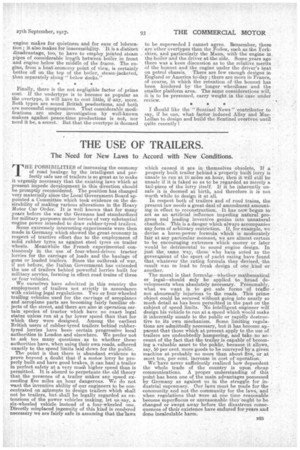THE USE OF TRAILERS.
Page 5

If you've noticed an error in this article please click here to report it so we can fix it.
The Need for New Laws to Accord with New Conditions.
THE POSSIBILITIES of increasing the economy of road haulage by the intelligent and perfectly safe use of trailers is so great as to make it urgently necessary that the existing laws which at present impede development in this direction should be promptly reconsidered. The position his changed very materially since the Local Government Board appointed a Committee which took evidence on the desirability of making various alterations in the Heavy Motor Car Order. It is well known that for many years before the war the Germans had standardized for military purposes motor lorries of very substantial engine power intended to draw rubber-tyred trailers.
Some extremely interesting experiments were then made in Germany which showed the great economy in respect of tractive effort due to the employment of solid rubber tyres as against steel tyres on trailer wheels. MeaarWhile the French experimented continuously in the use of four-wheel-driven tractor lorries for the carriage of loads and the haulage of .guns or loaded trailers. Since the outbreak of war, if not before, the Italian Government has extendei the use of trailers behind powerful lorries built for military service, forming in effect road trains of three or four vehicles.
We ourselves have admitted in this country the employment of trailers not strictly in accordance with existing legal regulations. Two or four-wheeled trailing vehicles used for the carriage of aeroplanes and aeroplane parts are becoming fairly familiar objects of the street, and there are also in operation certain , species of tractor which have no exact legal status unless run at a far lower speed than that for which they were designed. Among the earliest British users of rubber-tyred trailers behind rubbertyred lorries have been certain progressive local authorities in London and elsewhere. We prefer not to ask too many questions. as to whether these authorities have, when using their own roads, adhered exactly to the speed limits laid down for the public.
The point is that there is abundant evidence to prove beyond a doubt that if a motor lorry be properly built and have good brakes, it can haul a trailer in perfect safety at a very much higher speed than is permitted. It is absurd to perpetuate the old theory that the presence of a trailer makes any speed exceeding five miles an hour dangerous. We do not want the inventive ability of our engineers to be concentrated on attempts to design trailers which shall not be trailers, but shall be legally regarded as extensions of the power vehicles making, let us say, a, six-wheeled vehicle instead of a four-wheeled rine. Directly misplaced ingenuity of this kind is rendered necessary we are fairly safe in assuming that thei.aws which caused it are in themselves obsolete. If a properly built trailer behind a properly built lorry is unsafe to run at 10 miles an hour, then it will still be unsafe if it is faked so as to be regarded as merely a tail-piece of the lorry itself. If it be inherently unsafe it is doomed at birth, and therefore it is not worth while to design it at. all. In respect both of trailers and of road trains, the present law needs a great deal of amendment amounting in effect to reconstruction. It has now begun to act as an artificial influence impeding natural progress and leading inventive genius into unnatural channels. This is a danger which always accompanies any form of arbitrary restriction. If, for example, we devise a, horse-power formula which is moderately fair at any particular moment, we are almost certain to -be encouraging extremes which sooner or later would be detrimental to sound engine design. In just the, same way, •those who have acted as the government of the sport of yacht racing have found that whatever the rating formula they devised, the result was to lead to freak design of one kind or another..
The. moral is that formulw—whether mathematical or legal—should only be applied to broad developments when absolutely necessary. Presumably, what we want is to get safe forms of traffic, • not abnormally injurious to the roads. This prime object could be secured without going into nearly so much detail as has been permitted in the past on the subject of speed limits. No intelligent engineer will design his vehicle to run at a speed which would make it inherently unsafe to the public or rapidly destructive to its own mechanism. Some limiting regulations are admittedly necessary, but it has become apparent that those whieh at present apply to the use of trailers are undoubtedly hampering, and take no account of the fact that the trailer is _capable of becom• ing a valuable asset to the -public, because it allows, say, 50 per cent. more goods to be conveyed by a given machine at probably no more than about five, or at most ten,' per cent, increase in cost of 'operation. We-have never sufficiently realized how dependent . the wholetrade of the country is upon cheap communications, A proper understanding of this point has been one of the main advantages possessed by Germany as against us in the struggle for industrial supremacy. Our laws must be made for the community and not the community for the laWS;:and ' when regulations that were at one time reasonable become superfluous or unreasonable they aught to be changed or swept away before the disastrous consequences of their existence have endured for years and done incalculable harm.






















